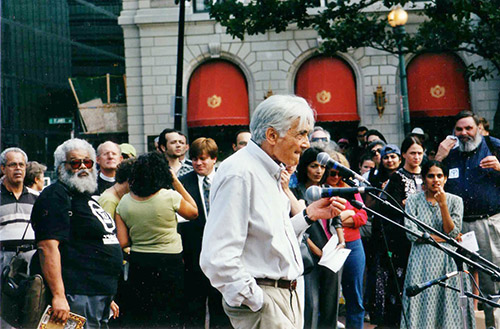
Howard Zinn addressing an anti-war demonstration in Boston in 2002. The poet Gary Hicks (white beard) is seen on the left. —photo Tanbou
L’historien étatsunien Howard Zinn est mort le 27 janvier 2010 durant une visite en Californie. Il avait 87 ans. Critique sévère de la politique étrangère impérialiste des États-Unis, il est surtout connu pour son magistral ouvrage, Histoire populaire des États-Unis, publié en 1980, dans lequel il met en relief les non-dits et les rôles souvent cruciaux et déterminants que jouent dans l’histoire du pays les entités négligées par l’historiographie traditionnelle: les esclaves, les immigrants pauvres, les travailleurs, les résistants indiens, les mouvements pour la revendication des droits civils, des droits de la femme, etc.
Howard Zinn ne s’était pas limité à la formulation d’une nouvelle théorie de l’Histoire—l’Histoire « par en bas »*—, il voulait surtout participer dans la praxis pour le changement, c’est-à-dire dénoncer, protester, réfuter le système politique ambiant tout en cherchant à construire un autre, révolutionnaire, un autre paradigme, une nouvelle façon de comprendre et d’appréhender l’Histoire. Et d’agir pour corriger ses manquements et injustices. Il a dénoncé toutes les guerres impérialistes où se sont engagés les États-Unis, Vietnam, Corée, Cuba, Grenade, Panama, Nicaragua, Irak, Afghanistan, etc. Il était un homme de principe, très accessible à tout le monde et croyant inébranlable dans la résistance des peuples comme motrice de l’Histoire. Il nous manque déjà.
Nous ré-publions ci-après le texte anglais de Matthew Rothschild que nous trouvons très approprié pour la circonstance.
—TTG
* Il n’était pas le seul, son emphase sur le « peuple étatsunien » a été employée avant lui par d’autres historiens tel Page Smith dont ses ouvrages, entre autres A People History of the American Revolution, A People History of the Civil War, font usage du même procédé.
Thank You, Howard Zinn
—by Matthew Rothschild, January 28, 2010
Thank You, Howard Zinn, for being there during the civil rights movement, for teaching at Spellman, for walking the picket lines, and for inspiring such students as Alice Walker and Marian Wright Edelman.
Thank you, Howard Zinn, for being there during the Vietnam War, for writing “The Logic of Withdrawal,” and for going to Hanoi.
Thank you, Howard Zinn, for always being there.
Thank you, Howard Zinn, for being a man who supported the women’s liberation movement, early on.
Thank you, Howard Zinn, for being a straight who supported the gay and lesbian rights movement, early on.
Thank you, Howard Zinn, for being a Jew who dared to criticize Israel’s oppression of the Palestinians, early on.
Thank you, Howard Zinn, for being a great man who didn’t believe in the “Great Man Theory of History.”
Thank you, Howard Zinn, for taking the time to write your landmark work, “A People’s History of the United States,” and for educating two generations now in the radical history of this country, a history, as you stressed, of class conflict.
Thank you, Howard Zinn, for grasping the importance of transforming this book into “The People Speak,” the History Channel special that ran in December and that should be used by secondary, high school and college classes for as long as U.S. history is taught.
Thank you, Howard Zinn, for opposing war, all wars, including our own “good wars,” our own “holy wars,” as you called them—and for pointing out that a “just cause” does not lead to a “just war.”
Thank you, Howard Zinn, for pointing out that soldiers don’t die for their country, but that they die for their political leaders who dupe them or conscript them into wars. And that they die for the corporations that profit from war.
Thank you, Howard Zinn, for urging us to “renounce nationalism and all its symbols: its flags, its pledges of allegiance, its anthems, its insistence in song that God must single out America to be blessed. We need to assert our allegiance to the human race, and not to any one nation.”
Thank you, Howard Zinn, for stressing that change comes from below, and that it comes at surprising times, even when things seem bleakest, if we organize to make it happen.
Thank you, Howard Zinn, for stressing the value of engaging in action to make this world a better place, even if we don’t get there.
Thank you, Howard Zinn, for this amazing, inspiring paragraph, which I’ve had on my wall for years now:
“To be hopeful in bad times is not just foolishly romantic. It is based on the fact that human history is a history not only of cruelty, but also of compassion, sacrifice, courage, kindness. What we choose to emphasize in this complex history will determine our lives. If we see only the worst, it destroys our capacity to do something. If we remember those times and places—and there are so many—where people have behaved magnificently, this gives us the energy to act, and at least the possibility of sending this spinning top of a world in a different direction. And if we do act, in however small a way, we don’t have to wait for some grand utopian future. The future is an infinite succession of presents, and to live now as we think human beings should live, in defiance of all that is bad around us, is itself a marvelous victory.”
Thank you, Howard Zinn, for recognizing the beauty and power of culture, and for exalting the poet, the singer, the actor, the artist.
Thank you, Howard, for being kind enough to write your columns this last decade for a relatively obscure magazine called The Progressive, and for doing so with the utmost intelligence and grace.
Thank you, Howard, for calling me your editor.
Thank you, Howard, for your wry and self-deprecating sense of humor.
Thank you, Howard, for your kindness.
Thank you, Howard, for your friendship.
Thank you, Howard.
Thank you.
